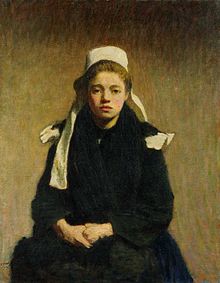This article needs additional citations for verification. (July 2024) |
 Une Jeune Bretonne ("A young Breton woman"), painting by Roderic O'Conor | |
| Total population | |
|---|---|
| c. 6–8 million | |
| Regions with significant populations | |
| France | 6–7 million |
| Brittany | 3,318,904[1][note 1] |
| Loire-Atlantique | 1,394,909[2][note 2] |
| Île-de-France | 1,500,000[3] |
| Le Havre | 70,000[4] |
| Canada (predominantly Quebec) | 17,465[5] |
| Languages | |
| French, Breton, Gallo | |
| Religion | |
| Predominantly Roman Catholic | |
| Related ethnic groups | |
| Celts: Britons (Cornish, English and Welsh) and Gaels (Irish, Manx and Scots)[6] | |
The Bretons (/ˈbrɛtɒnz, -ənz, -ɒ̃z/;[7] Breton: Bretoned or Vretoned,[8] Breton pronunciation: [breˈtɔ̃nɛt]) are an ethnic group native to Brittany, north-western France. They trace their heritage to groups of Brittonic speakers who emigrated from southwestern Great Britain, particularly Cornwall and Devon, mostly during the Anglo-Saxon settlement of Britain. They migrated in waves from the 3rd to 9th century (most heavily from 450 to 600) into Armorica, which was subsequently named Brittany after them.[9]
The main traditional language of Brittany is Breton (Brezhoneg), spoken in Lower Brittany (i.e., the western part of the peninsula). Breton is spoken by around 206,000 people as of 2013.[10] The other principal minority language of Brittany is Gallo; Gallo is spoken only in Upper Brittany, where Breton used to be spoken as well but it has seen a decline and has been less dominant in Upper Brittany since around the year 900. Currently, most Bretons' native language is standard French.
Historically, Brittany and its people have been counted as one of the six Celtic nations. The actual number of Bretons in Brittany and France as a whole is difficult to assess as the government of France does not collect statistics on ethnicity. The population of Brittany, based on a January 2007 estimate, was 4,365,500.[11] There is reason to believe that this number includes the department of Loire-Atlantique, which the Vichy government separated from historical Brittany in 1941.[12]
It is said that, in 1914, over one million people spoke Breton west of the boundary between the Breton and Gallo-speaking region—roughly 90% of the population of the western half of Brittany. In 1945, Breton speakers consisted about 75% of the population. Today, in all of Brittany, at most 20% of the population can speak Breton. 75% of the estimated 200,000 to 250,000 Breton speakers using Breton as an everyday language are over the age of 65.
A strong historical emigration has created a Breton diaspora within the French borders and in the overseas departments and territories of France; it is mainly established in the Paris area, where more than one million people claim Breton heritage. Many Breton families have also migrated to the Americas, predominantly to Canada (mostly Quebec and Atlantic Canada) and the United States. The only places outside Brittany that still retain significant Breton customs are in Île-de-France (mainly Quartier de Montparnasse in Paris), Le Havre and Îles des Saintes, where a group of Breton families settled in the mid-17th century.
- ^ "Populations légales des régions en 2017". INSEE. Retrieved 13 September 2020.
- ^ "Populations légales des départements en 2017". INSEE. Retrieved 13 September 2020.
- ^ Rolland, Michel. "La Bretagne à Paris". Archived from the original on 2016-11-30. Retrieved 31 December 2016.
- ^ "Ils sont 70 000 ! Notre dossier sur les Bretons du Havre". Archived from the original on 20 December 2016. Retrieved 31 December 2016.
- ^ "Canada Census Profile 2021". Census Profile, 2021 Census. Statistics Canada Statistique Canada. 7 May 2021. Retrieved 3 January 2023.
- ^ Ed. Wade Davis and K. David Harrison (2007). Book of Peoples of the World. National Geographic Society. p. 225. ISBN 978-1-4262-0238-4.
- ^ Wells, John C. (2008). Longman Pronunciation Dictionary (3rd ed.). Longman. ISBN 978-1-4058-8118-0.
- ^ After the definite article, B > V (See Breton mutations)
- ^ Koch, John (2005). Celtic Culture: A Historical Encyclopedia. ABL-CIO. p. 275. ISBN 978-1-85109-440-0. Retrieved September 29, 2012.
- ^ "Breton". Ethnologue. Retrieved 2017-06-09.
- ^ "Breton Language". Retrieved 31 December 2016.
- ^ "France: Bretagne population 2023". Statista. Retrieved 2023-05-03.
Cite error: There are <ref group=note> tags on this page, but the references will not show without a {{reflist|group=note}} template (see the help page).